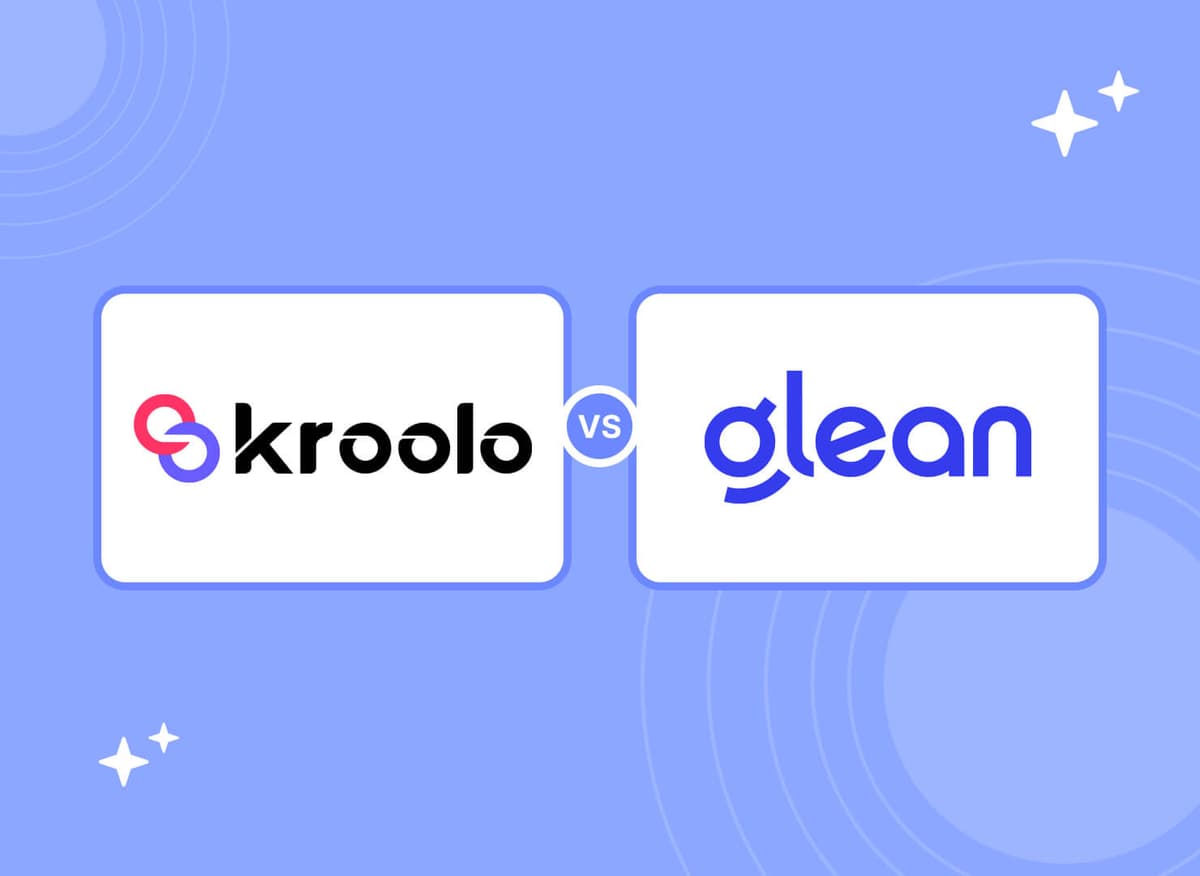


Oct 13, 2025
-
By Clive

![]() AI Summary By Kroolo
AI Summary By Kroolo
Modern enterprises are drowning in data—scattered across cloud drives, chat apps, CRMs, and project tools. Employees spend nearly 30% of their workday just searching for files or messages across platforms like Slack, Jira, and Google Drive. Every lost minute of context-switching drains productivity and slows decision-making.
That’s where Enterprise Search transforms chaos into clarity. The right platform centralizes knowledge, understands context, and retrieves relevant insights instantly. Among today’s top contenders, Kroolo and Glean stand out—both use AI to redefine enterprise search, but their underlying philosophies and execution differ significantly.
This guide compares Kroolo vs Glean Enterprise Search in depth—covering architecture, search capabilities, AI features, pricing, security, and practical use cases—so you can identify which platform aligns with your organization’s search strategy and digital ecosystem.
Glean operates as a dedicated enterprise search layer, designed to sit atop existing systems. Built on semantic and retrieval-augmented generation (RAG) architecture, it acts like “the Switzerland of enterprise search.” Glean indexes data from over 100 tools—Google Workspace, Salesforce, ServiceNow, Confluence—and structures it into a knowledge graph for contextual search.
It connects to your ecosystem, not within it. This makes Glean ideal for large organizations managing multiple tools and seeking a unified search interface without changing their existing infrastructure. It focuses purely on retrieval and discovery, not work execution.
Kroolo, on the other hand, approaches enterprise search differently—it’s embedded directly into its unified Work OS. Every project, task, document, and discussion lives in one connected environment, making search not just faster but context-aware. Its principle is simple: “One platform for projects, collaboration, and intelligence.
Instead of layering search over multiple disjointed tools, Kroolo replaces them. It combines task management, document collaboration, and AI-driven insights into a single workspace—meaning search doesn’t just retrieve information; it understands how that information fits into your workflows.
|
|
|
|
|
|
|
|
|
|
|
|
|
|
|
|
|
|
|
|
In essence, Glean searches across your tools, while Kroolo searches within your work—bridging discovery and execution seamlessly.
|
|
|
|
|
|
|
|
|
|
|
|
|
|
|
|
|
|
|
|
|
|
|
|
|
|
|
|
|
|
|
|
Verdict: With instant indexing and contextual awareness, Kroolo delivers superior search relevance inside projects and workflows, while Glean excels in cross-system knowledge discovery.
|
|
|
|
|
|
|
|
|
|
|
|
|
|
|
|
|
|
|
|
|
|
|
|
|
|
|
|
Kroolo transforms enterprise search into actionable intelligence. It not only finds information but also uses AI agents to complete tasks—drafting documents, scheduling projects, or generating summaries. Glean focuses on accurate retrieval, while Kroolo focuses on autonomous execution, making enterprise search a proactive productivity tool.
|
|
|
|
|
|
|
|
|
|
|
|
|
|
|
|
|
|
|
|
|
|
|
|
Kroolo merges enterprise search with collaboration, allowing users to locate, edit, and act on information in real time. Glean, by comparison, indexes external tools but doesn’t facilitate in-platform execution.
|
|
|
|
|
|
|
|
|
|
|
|
|
|
|
|
|
|
|
|
Result: In the Glean vs Kroolo cost comparison, Kroolo clearly provides greater value—combining enterprise search, automation, and collaboration under one subscription.
Both Kroolo and Glean deliver strong enterprise-grade security and compliance. They adhere to key standards including SOC 2, GDPR, HIPAA, and ISO 27001.
Kroolo offers more flexibility with self-hosted and cloud options, ideal for businesses wanting greater control over data location. Glean, however, primarily operates through Google Cloud environments. Both ensure strong permission management—Kroolo using real-time role-based access, and Glean inheriting permissions from the original systems.
Encryption is end-to-end for both, safeguarding data in transit and at rest. Yet Glean has a slight edge in advanced Data Loss Prevention (DLP), making it suitable for industries with stringent compliance needs. Meanwhile, Kroolo balances robust compliance with simplicity and fast deployment—perfect for mid-market teams seeking security without added complexity.
Both platforms serve distinct purposes in enterprise search adoption.
Glean fits large enterprises that rely on multiple disconnected systems such as Google Workspace, Salesforce, Microsoft 365, or ServiceNow. It provides top-tier semantic search across all platforms, ensuring knowledge is discoverable without altering existing workflows.
This makes Glean the go-to solution for regulated industries like healthcare or finance, where data governance and compliance are critical. A global healthcare firm, for example, can leverage Glean’s knowledge graph to unify research data, patient records, and compliance documents securely.
Kroolo excels where teams want to eliminate tool sprawl and centralize projects, documents, and AI-powered search in one workspace. It benefits startups and mid-sized organizations looking for productivity, real-time collaboration, and automation.
A SaaS company using multiple tools for documentation, communication, and task tracking could easily consolidate them under Kroolo, achieving faster execution and reducing operational overhead.
While some enterprises experiment with both platforms—using Glean for external data search and Kroolo for internal workflows—most find greater efficiency by choosing one. In short, Glean enhances retrieval, whereas Kroolo redefines how work gets done.
Tags
Project Management
AI